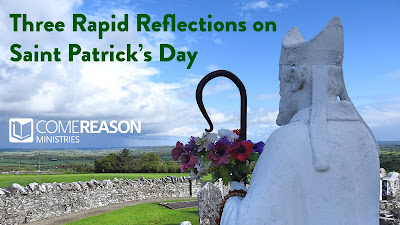The midweek Bible study group at my church is completing their study on the book of Revelation and I was asked to provide a few thoughts on the last two chapters of this amazing portion of Scripture.
The rainbow has had quite a bit of visibility in our society. The bands of red at the top transitioning through six hues to a violet bottom reflect the order of the rainbow produced by refracting the sun’s natural light. Today, we see the rainbow adopted as a symbol, most prevalently in what has become known as the “Pride Flag.” Designed in 1978, the rainbow was chosen because it had some popularity in the ‘60s hippie culture but also because “the colors reflect the diversity of the LGBT community and the spectrum of human sexuality and gender.”1
Ironically, as other communities of grievance have appeared, people have felt the represented spectrum isn’t diverse enough, so color band have been added, lines have been multiplied, and triangles now appear so that it no longer reflects anything natural at all. It has become much more a symbol of politics than a reflection of natural order.
Of course, this isn’t the first time the rainbow has been used as a symbol. The Bible tells us that its role has been symbolic by its very design.
The First Recreation
In Genesis 6 we read that when God saw that every inclination of the human mind was nothing but evil all the time, he destined the world to be destroyed. Yet, God preserved his faithful and allowed the earth to be recreated. Genesis 9:8-15:
“But you, be fruitful and multiply; spread out over the earth and multiply on it.”
Then God said to Noah and his sons with him, “Understand that I am establishing my covenant with you and your descendants after you, and with every living creature that is with you—birds, livestock, and all wildlife of the earth that are with you—all the animals of the earth that came out of the ark. I establish my covenant with you that never again will every creature be wiped out by floodwaters; there will never again be a flood to destroy the earth.”
And God said, “This is the sign of the covenant I am making between me and you and every living creature with you, a covenant for all future generations: I have placed my bow in the clouds, and it will be a sign of the covenant between me and the earth. Whenever I form clouds over the earth and the bow appears in the clouds, I will remember my covenant between me and you and all the living creatures: water will never again become a flood to destroy every creature. (CSB)
Tonight, we finish the book of Revelation, reading about the second recreation of God’s world. Did God break his promise? Oh no, for, like any good lawyer, the answer lies in the specifications of the contract. God destroys the earth the second time not by water, but by fire! Again, the motivation is to wipe out the infection of evil that people have carried throughout God’s creation. In Revelation 21:23 we are told the new world will no longer have the sun. So, here's the question: Will there be a rainbow in the New Heavens and the New Earth?
Living in the Already and Not Yet
For those of you who read last week, the answer should be an unqualified Yes. There will be a rainbow, but it will be of a different type. The foundations of the city shone with the twelve jewels, sparkling in vivid colors. (You see, the light of God cannot be divided so refraction cannot occur there.) God’s word endures even through the recreation as his promise is never to end.
The rainbow is just one example of a promise that we have already received, but one that has yet to be completely fulfilled. On Sunday, I mentioned this as living in the “Already and Not Yet.” We are already living in the Kingdom of God; it has come among us. But we are not yet delivered into its full hope and promise.
We see this kind of tension over and over again in Scripture: 2
- Hebrews 2:8–9: “At present, we do not yet see everything in subjection to him. But we see him who for a little while was made lower than the angels, namely Jesus, crowned with glory and honor because of the suffering of death”
- 1 John 3:2: “Dear friends, now we are children of God, and what we will be has not yet been made known. But we know that when Christ appears, we shall be like him, for we shall see him as he is.
Other aspects of the “already, but not yet”:3
- Already adopted in Christ (Romans 8:15), but not yet adopted (Romans 8:23);
- Already redeemed in Christ (Ephesians 1:7), but not yet redeemed (Ephesians 4:30);
- Already sanctified in Christ (1 Corinthians 1:2), but not yet sanctified (1 Thessalonians 5:23–24);
- Already saved in Christ (Ephesians 2:8), but not yet saved (Romans 5:9);
- Already raised with Christ (Ephesians 2:6), but not yet raised (1 Corinthians 15:52).
Living Our Lives as Part of The Already and Not Yet
Here’s the thing about Revelation and the end times—most Christians see it as this future event where Jesus will vindicate his church, defeat evil, and provide us with a blissful existence for eternity. But that’s what Saul of Tarsus believed as he headed out for Damascus, too. He waited for his messiah to vanquish Rome, to restore God’s people to their rightful place and to live as a good Jew should. Saul was wrong. The Messiah has already come and it was the light of the Lamb, striking him blind and knocking him down that actually opened his eyes and his heart to the deeper truth that Paul could have all of that right now. It is that revelation that allowed him to happily suffer and be imprisoned for the sake of the Gospel. The reality of God’s Kingdom was buried too deep in Paul’s heart for external difficulties to diffuse it. He saw it as one would see a rainbow: there is no hard lines between the colors. The simply flow one into the next naturally so that eventually you are at the other side.
We can have all the promises of heaven right now.
- Can we dwell with God today? Yes!
- Can we enjoy the blessings of righteousness today? Yes!
- Can we have blessed fellowship with others of his kingdom? Yes!
As we wrap up this book, let’s not wait for God to do something before we respond. Let’s remember that through his church, we are vindicating Christ via good works. We are defeating evil becaue the gates of hell cannot prevail against us, we are granted eternal life right now in Jesus Christ. We are his body. Let us not waste a moment, but live with an eternal perspective seeing all the beautiful colors and hues God has placed before our lives.
References
1. “Rainbow Flag (LGBT).” Wikipedia, Wikimedia Foundation,
27 Mar. 2022, https://en.wikipedia.org/wiki/Rainbow_flag_(LGBT).
2. “What Is the Concept of ‘Already but Not Yet’?” GotQuestions.org,
Got Questions Ministries, 29 May 2014,
https://www.gotquestions.org/already-not-yet.html.
3. Briones, David. “Already, Not Yet: How to Live in
the Last Days.” Desiring God, 31 Mar. 2022,
https://www.desiringgod.org/articles/already-not-yet.



